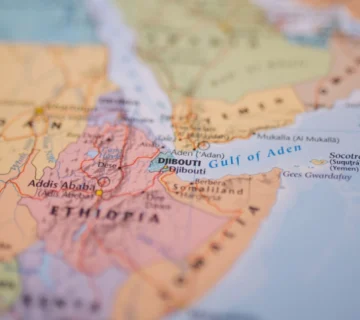It has been 25 years since the world started to pay closer attention to the role that media freedom plays in the growth of democratic societies. Yet, disinformation, which has reared its powerful head in the recent past, is threatening to undo some of the gains made in the freedom of media expression and to unravel the threads in the democratic fabric of some societies in the Horn of Africa region, and beyond it.
Speaking at a media literacy event to mark the 2018 World Press Freedom Day at the American Reference Center in Kenya’s capital, Nairobi, American Ambassador, Robert Godec, said, “Fake news is extremely dangerous,” as it “can create tension and violence in some circumstances,” and “undermine democracy.” The global theme of this year’s World Press Freedom Day is ‘Keeping power in check: media, justice, and the rule of law.’ Ambassador Godec cited problems around the 2017 general poll in Kenya, such as heightened tension that was fanned, in part, by the distribution of fake news.
The Extra Burden
The advent of fake news complicates matters for journalists’ search for the truth. “People are suspicious even when the information being shared is true,” observes Anthony Shop, a digital media advocate. Fake news adds to the myriad of challenges that journalists face to tell stories. That journalists risk losing their livelihoods and face regular threats to life and limb in both democratic and autocratic countries around the world cannot be overemphasized.
According to the 2018 World Press Freedom Index, the best-ranked country in the Horn of Africa, at number 93 is Tanzania. Kenya followed at position 96. Eritrea ranked lowest, at number 179. The Index ranked 180 countries based on, among other indicators: multiplicity of voices, independence of media, the environment in which the journalists work, and access to both information and means of news production.
2018 World Press Freedom Index: Ranking of Horn of Africa Countries
| COUNTRY | RANKING
(out of 180 countries) |
SCORE |
| Tanzania | 93 | 30.65 |
| Kenya | 96 | 30.82 |
| Uganda | 117 | 36.77 |
| South Sudan | 144 | 46.88 |
| Ethiopia | 150 | 50.17 |
| Somalia | 168 | 63.04 |
| Djibouti | 173 | 70.77 |
| Sudan | 174 | 71.13 |
| Eritrea | 179 | 84.24 |
Source: Reporters without Borders
Jennifer Thomas, a broadcast journalism professor, attributes rampant disinformation to the immediacy of social media, where information travels from source to recipient and the other way round almost in an instant. While the power of social media to connect communities has been lauded by some as the best thing about modern living, it should be harnessed responsibly, by governments and citizens.
Managing the Power of Social Media
Governments, including those in the Horn of Africa, can help counter fake news through campaigns to discredit disinformation. These campaigns should be carried out both online and offline, without infringing on the privacy and freedoms of individuals. Examples include online campaigns to help identify fake news, such as #StopReflectVerify. The governments should also increase levels of media literacy among citizens. Journalists and other media practitioners should provide context, which is useful in helping the masses to separate fact from fiction. Citizens should think critically before sharing unverified information.
Roselyne Omondi is the Associate Director, Research, HORN Institute.



